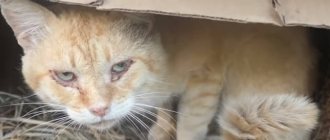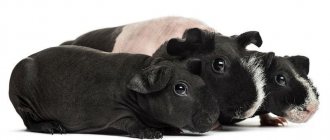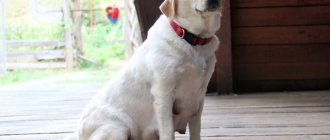Life expectancy of ferrets
Here it is worth drawing a clear line: whether we are talking about a domestic ferret or one that lives in the wild. The latter faces dangers, diseases, malnutrition and larger predators. The average duration of their existence is 2 years, and the most resourceful and cautious ones sometimes live up to four.
And what, in four years, this sweet and beloved baby, who appeared in your house and is exploring the surrounding space with such interest, will simply die! No, nothing like that, if you take good care of it and carefully monitor that your pet has enough of everything.
Eighty percent of the exact figure will depend on what the owner feeds his pet, how he cares for him and whether the ferret has any hereditary diseases. With a good diet and proper maintenance, the average lifespan of an animal at home will be 8 years, but you can try to make sure that the animal lives with you up to 15 years; such cases are not uncommon.
REFERENCE: a ferret or, using another name, a ferret, is a mammal that belongs to the order of predators, the mustelidae family. Even 800 years ago, ferrets were domesticated and served humans in the same way as hunting breeds of dogs still serve, but rabbits became the ferret's prey. Only much later did people appreciate the ferret’s quick wit and intelligence, let him into their homes, and his place became directly next to a person, which ferrets do not object to at all to this day.
In wild nature
The wild forest ferret is the most nimble, most attentive predatory of the representatives of its order. They live in the European part and in the North of Russia. for a ferret to have a body of water nearby, even if it is a simple stream. When the winter is snowy and cold, they move closer to people's homes. The animals feed on small rodents, such as voles, hamsters, moles, and water rats. They do not disdain birds; they eat fish and vegetables with less pleasure. Many people hunt for the forest ferret - owls, foxes, wolves, and even snakes. It is not surprising that its life in the wild is so short.
ATTENTION ! The ferret is a fast animal, but it cannot compare with the ermine and weasel. An adult can easily catch up with and capture the animal, but this should not be done. In a moment of danger, the animal activates a defensive reaction - it sprays a strong-smelling liquid from the secretion of the anal glands towards the enemy, and besides, in the wild, ferrets are angry and quite aggressive, catching him can result in severe bites and scratches.
At home
At home, the ferret is playful, affectionate, can learn commands if she wants, of course, she is accustomed to a tray and harness, and quite easily finds a common language with cats, dogs and small inhabitants of the house. An additional bonus for allergy sufferers is that ferret fur does not cause allergies. Well, for those who spend a lot of time at home, breeding ferrets can be a good income, especially since tinkering with baby ferrets is an incomparable pleasure.
How long will a sterilized animal live?
If you are not going to engage in breeding, then it is better to sterilize the ferret - this will significantly prolong its life and improve the health of your pet. At 6-8 months, the so-called rutting period begins for little ones - the hormonal background changes, the character changes, nature takes its toll and demands procreation.
If at this time you do not provide the opportunity for reproduction or do not sterilize the animal, then it will become aggressive, nervous, restless, there will be a failure in the hormonal system, first baldness will occur, then problems with internal organs will arise and your pet will quite possibly die. If the ferret is sterilized, then all this can be avoided and the animal may well live up to 15 years, while the average lifespan of a ferret is 8 years.
Age can be determined in several ways
Factors influencing the lifespan of a ferret
How long ferrets live depends on the following factors:
- Genetics. Heredity cannot be influenced, and if your ferret’s ancestors died young, then perhaps the animal will also die early. Therefore, it is better to buy an animal from reliable breeders, from whom you can check the life expectancy in the Furo genus.
- Vitamins. How long an animal will live depends on whether it receives enough vitamins, macro- and microelements. Their deficiency can cause various health problems that will shorten the pet's lifespan. Signs of a lack of vitamins are: hair loss, apathy in the animal. After consultation with a specialist, you can purchase special vitamin and mineral complexes at a veterinary pharmacy or pet store.
- Hygiene. The ferret is a very clean animal, so the cage where the pet lives should be cleaned every day. You need to change the water every day and constantly wash the food bowl. You need to make sure that the litter is always dry and clean; if you keep the ferret in unsanitary conditions, it will get sick.
- Physical activity. Hori are distinguished by their mobility, so in order for the pet to feel good, it needs to be let out for a walk around the apartment. In this case, care must be taken to ensure that the ferret is not damaged. There should be no cracks or cracks in the room where the pet lives, since the furo has a very flexible body; if the animal gets into a narrow space, it can get stuck there and die. You need to make sure that your pet doesn’t eat something forbidden and get poisoned.
- Communication. Ferrets quickly get used to people, so it is important to devote a sufficient amount of time to the animal. If an animal does not feel that it is loved, it is unlikely to live long.
How to determine the age of a ferret
There are several ways to find out the age of a ferret. Take a closer look at the wool. A puppy's fur is gray until one and a half months old, and at two or three months the color is already more clearly visible. Touch the fur - if it is soft, like that of a baby, it is a puppy up to a year old, and if it is already hard, like the hair of an adult, then your ferret is already fully grown.
The second way to determine age is to look into the mouth of the beast. Puppies have milk teeth up to one and a half months, at three months the puppy already has full-fledged fangs, after which the teeth gradually turn yellow and by about six years they become completely yellow.
The third method is a visual inspection; it does not require contact with the animal: just watch the ferret. The puppies happily run around, play, and constantly find new things to do. Adult ferrets are more sedate, they sleep a lot, but they still play with pleasure, just not as actively. Older ferrets, after six years, prefer to lead a calm and measured lifestyle appropriate to their age.
Have you tried to determine the age of a ferret yourself?
Life of a ferret after castration or sterilization
It is impossible to predict how long ferrets will live after surgery. Surgery is performed by a veterinarian at 6-8 months of age.
An uncastrated/unsterilized pet during rutting or estrus becomes restless, aggressive and can attack the owner. To satisfy one male, at least three females . If he is not satisfied enough, a hormonal imbalance . This affects the pet’s well-being and lifestyle. The animal becomes lethargic, often sleeps and goes bald. Then digestive problems appear. With a thorough veterinary examination, the doctor diagnoses diseases of the internal organs. In such cases, treatment is not always effective, and there is a high probability of the pet’s rapid death. Similar changes occur in the female’s body if she is not satisfied. The ferret is susceptible to all kinds of tumor diseases .
The operated animals of both sexes behave naturally. The lack of desire does not affect their health; the animals are active and get sick less .
The life expectancy of a spayed/neutered ferret at home with proper care is 6-9 years.
If the owner’s plans do not include reproduction, it is better to rid the pet of “sexual problems” in a timely manner in order to preserve his health and life.
Is it possible and how to extend the life of a ferret?
We all love our pets and try to do everything possible to prolong the animal’s healthy and fulfilling life. This is not difficult to do with a ferret: arrange a decent place for him to live, get vaccinations on time, play with the animal, but give him enough freedom to independently explore the world or sleep at the time he needs, choose the right, balanced diet. Vitamins, movement, sunlight, communication and the opportunity for independent development - these are the components that can add several more happy years to your animal living in your family.
Can be fed with both dry food and natural food
How to create a menu
Many have found out in practice that the lifespan of cute little animals is largely determined by their diet. Therefore, it should be made balanced. In this regard, it is necessary to be guided by the fact that ferrets are predators.
The diet of animals should be dominated by beef, horse meat, and boneless fish.
feed offal (lung or stomach). If you decide to include porridge, then they must be cooked exclusively in meat broths. The owner of a ferret should not allow meat to be absent from the menu for a long time. Otherwise, you will have to face problems associated with disruptions in the gastrointestinal tract, a decrease in the immune system and hair loss.
The owner of a cute pet should not feed it citrus fruits or sweets. Ferrets should not be given milk because their bodies cannot digest lactose. Salty, fried or fatty foods can upset the animal's digestion.
In addition to the main menu, the animal should be supported with vitamin complexes. They can be purchased at special pet stores. When purchasing, the composition and dosage must be agreed with a veterinary specialist. In clinics, furry cats can be prescribed courses of injections that will significantly increase the body's defenses.
Liberty
Typically, ferrets live in a cage that is arranged according to their preferences, but you can also give your pet the opportunity to move freely around the apartment. To do this, you need to remove all small objects, and also make sure that vital wires are inaccessible to the rodent. It is also important to remove objects from the animal’s habitat that could injure him: knives, ski poles, guitar strings, poorly placed heavy folders, objects that break into fragments - the ferret is a very active animal, anything that can be chewed and dropped will certainly be chewed and dropped, especially if the ferret ended up in your house as a puppy.
How many years do ferrets live at home?
Owners protect their pets from various unfavorable factors, and with good care, pets have a much longer life expectancy.
Pets can reach this age only with proper care, proper feeding, and systematic veterinary care. There have been recorded cases of ferrets living up to 18 years.
Domestic ferrets need to be neutered. The procedure must be carried out after 6–8 months from the date of birth. A spayed male will not go into rutting season, and females will not go into estrus. The rut in males approximately begins at 5–8 months and lasts about six months. These deadlines may change.
During this period, males have a distinctive feature: they develop an unpleasant odor. Ferrets' behavior also changes. They become aggressive and restless, and begin to mark their territory. The structure of the coat changes: it looks dirty and sticky, and may thin out. A number of diseases of internal organs appear that can lead to the death of the pet.
A distinctive feature of females is that estrus does not stop when deprived of mating. It can last for several months, and this leads to a deterioration of immunity. If left untreated, it will lead to the death of the pet. After sterilization, the behavior of animals changes: they become calm and non-aggressive. It has been proven that in animals that have not had offspring, sterilization leads to an increase in life expectancy.
Being in the same home with members of the household, the ferret quickly becomes a favorite pet, giving with its presence a good mood and a lot of positive emotions
Therefore, it is important for owners to extend the life of animals, taking into account their lifestyle, character and living conditions
Little ferret
What affects life expectancy Why is this necessary What happens if you don’t listen to the recommendations Spacious housing Spacious housing is important for an animal. The cage should have everything necessary for living: a feeder, a drinking bowl, a tray, and “simulators”
Small housing has a negative impact on the pet, causing stress. Balanced diet The ferret is a predator. It feeds on chicken, turkey, horse, and fish fillets. Boiled carrots, zucchini, cabbage, chickpeas are useful. Millet, buckwheat, barley. The treat is a freshly caught mouse. Diseases of the gastrointestinal tract. Pure water in large quantities Drink 20 times during the day. A large volume of fluid prevents the body from overheating “thanks to” high mobility. Dehydration of a pet leads to death. Vitamins Your pet needs vitamin complexes; you should consult a veterinarian. Baldness of parts of the body, poor health. Physical activity For the ferret, all kinds of “simulators”, hammocks, and climbing equipment should be freely available. The young animal is hyperactive and needs to maintain “physical shape.” A sedentary lifestyle leads to poor health for your pet. Freedom of movement For a comfortable life, the animal needs to move throughout the apartment and find secluded corners. Stress, which provokes refusal to eat, baldness of the tail. Ensure safe movement around your home: swallowed small things cause death for the animal. Cage Hygiene The ferret is a clean animal. The cages must be cleaned daily: change the bedding, wash the drinking bowl and feeder. The pet's home should be warm and dry. Poor health of the pet. Psychological comfort They gladly accept care and affection from their owners. The animal should not be shouted at or left with unfamiliar pets. Behavior different from usual: often hides, does not go out to household members. Vaccinations For a full, long life, regular vaccinations are necessary, which your veterinarian will tell you in more detail. Diseases that will lead to death.
Om-Nom-nom
Diseases
Keeping a ferret is often associated with various diseases. The immunity of an animal living at home is susceptible to viruses and infections. The animal is not able to talk about its condition, so the owner must be attentive and notice any deviations in the baby’s behavior for timely help.
Diseases that ferrets are susceptible to are:
- Diarrhea is the result of poor nutrition;
- Worms. Infection occurs through contact with the environment. For treatment, anthelmintics are used;
- The mite appears under unsanitary cell conditions;
- Rabies and plague are serious diseases; timely vaccinations are mandatory;
- Infectious diseases, etc.
Your own place in the apartment
Just like a human, a ferret needs to have a safe haven, a place where it can hide if it wants to be alone. This is especially important for ferrets kept in free conditions, i.e. walking freely around the apartment. Such a place could be a cat house with a blanket or any other type of shelter where there is somewhere to burrow - after all, the ferret is a burrowing animal and is at peace in its burrow.
If the ferret lives in a cage, then it is very important to properly and competently arrange his “apartment”. The cage must be large - at least two square meters with a ceiling height of at least a meter. The walls of the cage should be made of metal mesh; under no circumstances should you put a ferret in a cage with ordinary bars - the animal chews on them and breaks its teeth. The space should be divided into 2-3 floors so that there is enough space for games and climbing.
Lifestyle and habits
The ferret belongs to the mustelidae family. He has a long flexible body, covered with beautiful and dense fur, short legs, and a fluffy tail. There is a contrasting pattern on the muzzle.
Domesticated horis living in human housing have an individual character. However, all animals, without exception, are playful, friendly, funny and curious. The animals quickly get used to their owners and willingly play with the inhabitants of the house.
Beige ferret
Important! The ferret's character deteriorates during the breeding season: the animal becomes irritable, sometimes even aggressive. Veterinarians strongly recommend spaying and sterilizing the animal.
Ferrets are predators by nature, so they are nocturnal, even living at home. The animals like to hide in secluded corners, hide in shoes and stir up the soil in flower pots. If small toys and food are found in a secluded place in the apartment, this is the pet’s doing.
Information! The ferret gets along well with cats and dogs, but living together with rodents and birds is contraindicated.
Pets usually easily learn to go to the litter box, respond to the nickname Healthy animal - hyperactive, does not sit in one place, the idea arises that there are several ferrets in the apartment. For an animal to live comfortably, proper upbringing and training is necessary.
Difficulties in content
- The ferret has an odor and is not suitable for people who are sensitive or allergic to animal fur.
- Irrepressible temperament, activity and stubbornness.
- They love to dig holes, so they can damage homemade flowers in pots.
- The ferret's body is absolutely not adapted to food from the human table, and can die from such food.
- Males mark territory during sexual activity.
- Often gets underfoot, suffers from kleptomania, and can hide food.
- He loves order and cleanliness, so he chews and spoils things he finds.
- Does not tolerate high temperatures and direct sunlight. Could die if left locked in a car without air conditioning.
- In veterinary medicine there are few competent specialists in the health of choreas.
- She sheds twice a year in the off-season and at 20 weeks of pregnancy. Lasts from 7 to 20 days.
Males and females differ from each other in size and behavior. Males are 1.5 - 2 times larger, they have thicker fur, larger paws and a wider head. Females are more elegant and graceful. They are also more playful and active, but less dependent and attached to the owner.
Rules for caring for animals
The ferret will spend most of his time in the cage, so the living conditions should be comfortable
First of all, the owner of the ferret must take care of the place where it is kept. The size of the cage for keeping the animal should be at least 80 cm, and the distance between the bars should not be more than 3–5 cm.
It is more advisable to opt for a two-level cell that has transitions. The animal, being in it, will be able to have an interesting time playing. A ferret's house should not be made of plastic or glass, as these materials do not provide good ventilation.
It is imperative to place trays for food and water in the cage. They should be heavier. This way, you can prevent your ferret from knocking over dishes. For added security, you can attach the tray to the bottom of the cage.
You can start releasing the animal only after it has adapted to new conditions. This must be done 2-3 hours a day. The owner must first remove all things, otherwise the nimble friend will hide everything and it will be difficult to find them.
When it's warm outside, you can take your ferret for a walk . This is only permitted for adult and vaccinated animals. Walking can also be done in winter, if there is a little snow and it is not very cold. For these purposes, you need to have a special leash available.
Particular attention should be paid to the sleeping area. The best place for a ferret will be a quiet and sunny side. It is recommended to use a terry towel or flannel as bedding.











